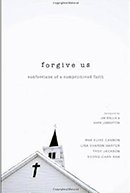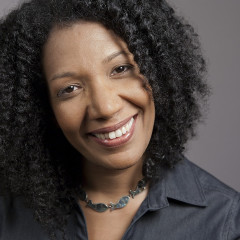
A bus station in Durham, North Carolina, May 1940. – Credit: Jack Delano / Courtesy: Library of Congress via Wikimedia Commons (http://bit.ly/YjKhPE)
Contemplative Christian Richard Rohr once said, “Most Christian ‘believers’ tend to echo the cultural prejudices and worldviews of the dominant group in their country, with only a minority revealing any real transformation of attitudes or consciousness. It has been true of slavery and racism, classism and consumerism and issues of immigration and health care for the poor.”
A quick review of Christian history reveals Rohr is correct, especially in America and among evangelicals. But what can Christians do to make amends for social sins that they didn’t personally commit?
A new book, Forgive Us: Confessions of a Compromised Faith, suggests Christians must confess and repent for the sins that they–and their religious ancestors–committed. The book is co-authored by seminary professor Soong-Chan Rah, World Vision’s Mae Elisa Cannon, Sojourner’s Lisa Sharon Harper, and Troy Jackson of the Amos Project. Here, I talk to Lisa about the book’s message and how she hopes Christians will respond.
RNS: You’ve identified ways the evangelical church has been complicit in sins of racism, sexism, violence toward the LGBTQ community, callousness toward those of other religions, and abuse of land. Is there a unifying thread that connects these?
LSH: While writing the last chapter, we identified a deeply seeded belief in almost every chapter: Some people bear more of the image of God than others. In other words, they are more human, more worthy of protection, more worthy of honor, more worthy of life, more worthy of freedom, more worthy of happiness. To clarify, to be fully human is to be white, male, and Christian.
Consider the slave codes. Consider the 3/5ths Compromise. Consider how the law blocked women from voting. Remember that only white male immigrants could become naturalized citizens. Consider the colonies’ early policy that baptized Christians could not be enslaved. Consider the violence the church tolerated and levied against the LGBTQ community—violence justified by the reality that LGBTQ people do not fit into the hard boundaries of maleness (and femaleness) as traditionally crafted to codify human value.
The belief that white, male, Christians are the only ones who bore the full image of God also explains why this elite set was the only one permitted to exercise full agency or stewardship over themselves (freedom), their families (gainful employment), their land (ownership), their towns, their states, and “their” nation (the vote).
RNS: You’re talking a lot about history. Why is it important that we learn this history?
LSH: The revelation of the core belief that has fueled much of our corporate sin has informed my understanding of the current events in Ferguson, the NFL’s lax approach to domestic violence, current day maneuvering by the Republican party, which is largely white, male, and claims to be Christian, to suppress the voting rights of minorities and women, and finally the GOP’s congressional failure to pass immigration reform. America’s core sin is at the heart of these problems.
RNS: You name confession as the proper biblical response to these corporate sins. What is the scriptural basis for this?
LSH: Forgive Us offers several examples, but my favorite is Nehemiah. He wasn’t a prophet or a priest, but a government guy. And he offers the church an invaluable picture of confession of corporate social sins. Nehemiah did not grow up in Israel. He and his family had nothing to do with the sin that caused the nation’s walls to be breached and burned by fire when Babylon attacked. Yet, Nehemiah stands in the gap for his people. He identifies with their sin as if it were his own and as if it was the sin of his family.
“Both I and my family have sinned,” Nehemiah says. “We have offended you deeply, failing to keep the commandments, the statutes, and the ordinances that you commanded your servant Moses.”
[tweetable] Confession always leads to repentance in scripture.[/tweetable]
RNS: Sins against people are easier to wrap our minds around, but why should evangelicals care about the land?
LSH: In the same way that we grew to understand the impacts of our core theological belief in human hierarchy, there are faulty core beliefs about humans’ relationship to the land. These core beliefs lay the foundations for our exploitation and degradation of it.
First, [tweetable]bad theology has taught us that we are separate from the rest of creation.[/tweetable] In the scripture, though, humanity is a part of creation. There is only division between creatures and Creator. To claim that humanity stands apart from creation is to place ourselves on the level of the Creator. This is idolatry.
Second, [tweetable]bad theology has taught us that “dominion” equals exploitation and domination.[/tweetable] Yet, in the agrarian cultural context of the original hearers, “dominion” would have meant something closer to “steward.” In modern language, it might mean “agency”—the ability to make decisions and choices that impact the world we live in. Humanity was commanded to steward the land, to make decisions that care for it, to protect it, and to serve its needs. This is our first calling. When we abdicate our responsibility we are turning our backs on God. And there are human consequences.
RNS: Where have you witnessed corporate confession in the church today?
LSH: I served as director of racial reconciliation for Intervarsity Christian Fellowship around Los Angeles for several years. Before that, I served as an Intervarsity campus minister at UCLA. During those years, I heard about one from a direct witness.
At an Intervarsity national staff conference in the mid-1990’s, one of the plenary sessions was supposed to focus on one thing, but ended up being a time of deep corporate confession.
Apparently, a staff worker of west African origin stood before the whole body and felt led by the Holy Spirit to acknowledge to the role of Africans in the buying and selling of Africans into the Transatlantic Slave Trade. He said to the African-Americans something like: “I confess to you that my people, Africans, sold your ancestors into slavery. American slavery was able to gain its original foundation largely because of our sin against you.”
Great wailing and weeping broke out across the room. The African-American staff workers as well as that African staff worker were immediately moved by the Spirit of God into lament. The tears were both cleansing and healing. The African staff worker’s confession confirmed a truth, that the African-Americans either did not know or knew, but had never been affirmed. His confession of the truth released them to feel the weight of that truth, to lament it, move through it, and rise from it.







